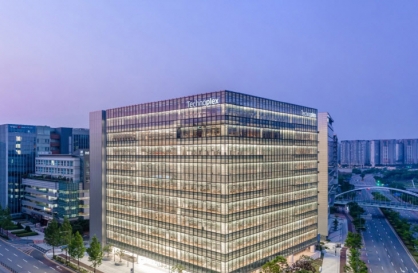The corporate credit ratings for Korean conglomerates and their affiliates have gone up amid growing worries over the neutrality and credibility of local credit ratings agencies, data showed Sunday.
Korea’s three major ratings agencies ― NICE Investors Service, Korea Investors Service and Korea Ratings ― have issued more upgrades than downgrades, boosting the up/down ratio for corporate credit ratings to 3.4, according to the Korea Capital Market Institute. A ratio above 1 means upgrades outnumber downgrades.
The ratio suggests that ratings agencies here are giving out grades far too generous to Korean firms despite the eurozone debt gloom that shrouds the global economy amid deteriorating investment sentiment.
The inflated up/down ratio of Korean ratings agencies is in sharp contrast to those of its international counterparts. Moody’s Investors Service, Standard & Poor’s Corp. and Fitch Ratings issued 10 downgrades and seven upgrades for Korean firms last year, according to the Korea Center for International Finance.
The overly optimistic reading of Korean firms’ credit status by local rating agencies is a reflection of the distorted relations between the two parties. Ratings agencies are supposed to remain strictly neutral in their assessment, but the complicated support systems among conglomerate units render it difficult to produce an objective decision.
Ratings agencies are also reluctant to cut credit ratings for their clients for fear of losing the commissions they get. Under the current system, companies foot the entire bill for the credit assessment, which makes it difficult for ratings agencies to maintain neutrality.
Conglomerates are putting pressure on ratings agencies or resorting to aggressive lobbying to upgrade their status, threatening to scrap contracts. As a result, more and more Korean firms have been given top grades in recent years.
The proportion of A-graded firms was 54.8 percent in 2008 before rising to 60.6 percent in 2009 and 70.5 percent in 2010.
By Yang Sung-jin (insight@heraldcorp.com)
Korea’s three major ratings agencies ― NICE Investors Service, Korea Investors Service and Korea Ratings ― have issued more upgrades than downgrades, boosting the up/down ratio for corporate credit ratings to 3.4, according to the Korea Capital Market Institute. A ratio above 1 means upgrades outnumber downgrades.
The ratio suggests that ratings agencies here are giving out grades far too generous to Korean firms despite the eurozone debt gloom that shrouds the global economy amid deteriorating investment sentiment.
The inflated up/down ratio of Korean ratings agencies is in sharp contrast to those of its international counterparts. Moody’s Investors Service, Standard & Poor’s Corp. and Fitch Ratings issued 10 downgrades and seven upgrades for Korean firms last year, according to the Korea Center for International Finance.
The overly optimistic reading of Korean firms’ credit status by local rating agencies is a reflection of the distorted relations between the two parties. Ratings agencies are supposed to remain strictly neutral in their assessment, but the complicated support systems among conglomerate units render it difficult to produce an objective decision.
Ratings agencies are also reluctant to cut credit ratings for their clients for fear of losing the commissions they get. Under the current system, companies foot the entire bill for the credit assessment, which makes it difficult for ratings agencies to maintain neutrality.
Conglomerates are putting pressure on ratings agencies or resorting to aggressive lobbying to upgrade their status, threatening to scrap contracts. As a result, more and more Korean firms have been given top grades in recent years.
The proportion of A-graded firms was 54.8 percent in 2008 before rising to 60.6 percent in 2009 and 70.5 percent in 2010.
By Yang Sung-jin (insight@heraldcorp.com)
-
Articles by Korea Herald








![[Weekender] Korean psyche untangled: Musok](http://res.heraldm.com/phpwas/restmb_idxmake.php?idx=644&simg=/content/image/2024/05/02/20240502050841_0.jpg&u=)









![[Eye Interview] 'If you live to 100, you might as well be happy,' says 88-year-old bestselling essayist](http://res.heraldm.com/phpwas/restmb_idxmake.php?idx=652&simg=/content/image/2024/05/03/20240503050674_0.jpg&u=)
